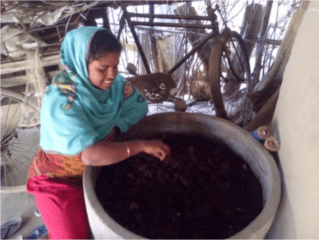After being denied a complete education because she was forced to marry at 14, Razia Sultana, from Bangladesh, now serves as both a model of self-reliance and an advocate for the education of girls and children in her community.
Hustling to find alternative methods to rescue her family from destitution, Razia was informed of The Hunger Project’s Women Leader Foundation Course. It was during this course that she realized that “every woman should be skilled and economically self-reliant… Otherwise, the problems of women could never be solved…”
Razia, now empowered with knowledge of how to change her situation, collaborated with The Hunger Project to set up a tailoring course and participate in an animator training and Participatory Action Research (PAR) training. In just a few days, Razia organized a self-help group consisting of 25 women from her village. This group met on a monthly basis, collecting savings, practicing PAR and discussing social issues.
But it was not until she attended a training on organic fertilizer that Razia had a truly eye-opening experience. Razia set up her own compost plant to produce organic fertilizer for her home garden and, with the support of The Hunger Project, learned about topics such as integrated pest management (organic IPM) and natural hormone production.
Razia encouraged 20 other women in her village to set up their own organic compost plants. But she did not stop there. She also decided to learn how to raise poultry and livestock. Now, from tailoring, selling organic fertilizer, raising poultry and livestock, and accruing savings, Razia’s monthly income rounds out to about 8,000 taka ($102 USD) per month, allowing her to easily support the health and education of her children.
Although Razia could not complete her own education, she now goes beyond ensuring the education of her own children by serving as an advocate and model for the rest of her community to place value on child education. She also hosts community meetings on nutrition, income-generating activities, dowry, early marriage, birth registration, preventing domestic violence, and other important topics in hopes that every woman will become empowered and self-reliant.
Q4 2014 Activity Report
Learn more:
Learn more about The Hunger Project’s work in Bangladesh
